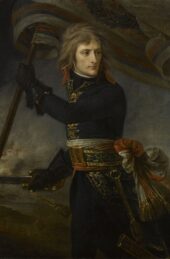Kissinger on Ukraine
In his doctoral thesis, published in 1957 as A World Restored. Metternich, Castlereagh and the Problems of Peace 1812-1822, Henry Kissinger put up a strong defence of the settlement reached at the Congress of Vienna. He argued that as there could be no going back to the principle of divine right on which the ancien régime had rested before 1789, a new legitimacy had to be established to replace it, and this had been achieved by his hero, the Austrian Chancellor Metternich.
This new legitimacy was based on power – that of the four ‘Great Powers’ as they styled themselves: Russia, Prussia, Austria and Great Britain. As long as those four, and later five with the admission of France, worked in the ‘Concert of Europe’, they could maintain peace and stability. There was no room in this arrangement for the aspirations of lesser powers, let alone nations or ordinary people. That, implied Kissinger, a view endorsed by other historians such as the revered Paul W. Schroeder, was a small price to pay for a hundred years of peace in Europe.

Klemens von Metternich
There was no peace in Europe. The decade following the signature of the Vienna settlement in 1815 saw wars break out in Spain, Italy and Greece, involving the armed intervention of France, Austria and Russia, and ultimately Britain and Turkey. Two full-scale wars broke out in 1830, one between France and Holland over Belgium, the other between Russia and Poland. The 1830s witnessed two protracted vicious civil wars in Spain and Portugal, as well as a wave of popular risings in Switzerland which nearly turned into civil war in 1847. Between 1846 and 1848 there were wars involving Russia, Prussia, Austria and Sardinia, fought in Poland, Hungary, Italy and parts of Germany. In 1854 Britain, France and Sardinia went to war with Russia in the Crimea. In 1859-60 there was war between France, Sardinia and Austria which was so bloody it inspired the foundation of the Red Cross, and in 1866 one between Prussia, Austria and Denmark. Nor should one forget the dozens of revolts and insurrections that took place across Europe between 1820 and the Polish insurrection of 1863-4. They were all put down with military force and all cost lives. The Franco-Prussian War of 1870 caused carnage on a scale hitherto unknown, and led to the internecine bloodbath of the Paris commune. And that covers only the first half of the ‘century of peace’.
Britain dropped out of the Concert very quickly and proceeded to conduct dozens of wars around the globe, as did France, never a dedicated member. But the other three Great Powers, Russia, Prussia (later Germany) and Austria clung to the ideology of 1815, even when at war with each other. This wedded them to an increasingly autocratic standpoint in their own dominions which impeded progress and innovation, be it political, economic or social, and bolted a heavy lid on the aspirations of subject nations and ordinary people. This concert eventually brought them into conflict with each other in 1914, and that lid was blown off in 1917-18 as a result. The consequences were catastrophic not only for Europe but for civilisation.
In 1945 Stalin and Roosevelt imposed their own ‘concert’ on Europe, condemning swathes of it to decades of political, economic, cultural and social bondage while the USA and the USSR fought each other by proxy in other parts of the world. Neither had any sense of history or cared a toss about the people whose lives were destroyed by their armchair strategies.
More than thirty years after the collapse of that particular concert, Kissinger, who should know better, flies in to Davos to tell the world that Putin’s Russia must be preserved because a strong Russia is essential to the stability of Europe.
Really? Does the stability of Europe require the existence of a disgusting dictatorship which represses its own people, carries out cyber-attacks on other countries and meddles in their internal politics, assassinates its enemies and invades a neighbouring state without compunction, committing atrocities not seen in Europe since 1945?
History provides us with so much material on which to base our choices and guide our behaviour. Yet some people just refuse to heed its warnings and learn its lessons. One could dismiss Kissinger’s intervention as the harmless ravings of an old fool were it not that it will be seized upon as the words of a sage by the weasels who would have us betray the people of Ukraine for the sake of temporary peace and quiet, and cheap gas.
Adam Zamoyski is the author of Rites of Peace: The Fall of Napoleon & The Congress of Vienna







